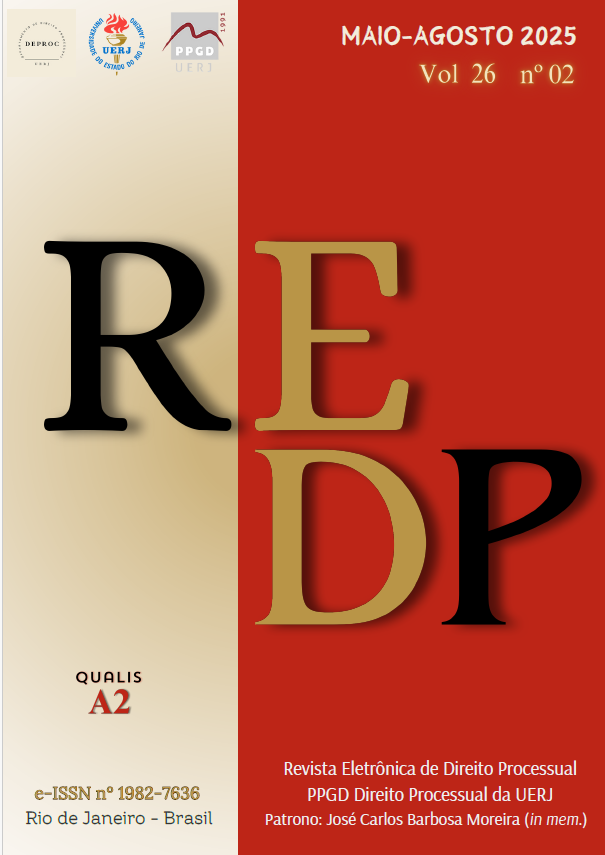A (ir)recorribilidade da decisão que recusa a intervenção do amicus curiae:
uma análise à luz do acesso à justiça
DOI:
https://doi.org/10.12957/redp.2025.87335Resumo
O Estado deve se aperfeiçoar para lidar com a heterogeneidade advinda de uma sociedade que se revela cada vez mais complexa e plural. E, com relação ao processo, o mesmo deve ocorrer. Nesse sentido, o amicus curiae se caracteriza como um elemento que abre os debates, antes limitado apenas às partes, eleva ao julgador pontos de vista e informações sobre o direito controvertido conferindo, bem por isso, maior legitimação democrática ao processo decisório e incrementando o acesso de diversos segmentos sociais ao Poder Judiciário, tudo em manifesto prestígio ao exercício da cidadania. A relevância institucional dos amicicuriae demonstra ser incompatível com as finalidades para as quais concebidos qualquer compreensão que lhes subtraia o direito de interpor recursos contra decisões que lhes indeferem as intervenções. E o mesmo se pode extrair do artigo 138 do Código de Processo Civil que, por sua vez, restringe o recurso apenas quando diante da decisão que admite a intervenção postulada.
Downloads
Publicado
Como Citar
Edição
Seção
Licença
Copyright (c) 2025 Osmar Paixão, Igor Itapary

Este trabalho está licenciado sob uma licença Creative Commons Attribution 4.0 International License.
Todos os artigos publicados na Revista Eletrônica de Direito Processual (REDP) (Departamento de Direito Processual, Universidade do Estado do Rio de Janeiro, Brasil) são licenciados por meio de uma Licença Creative Commons - Atribuição 4.0 Internacional (CC BY 4.0).
Os autores retêm os direitos autorais de seu artigo e concordam em licenciar seu trabalho com a licença CC BY 4.0, aceitando assim os termos e condições específicos desta licença disponíveis no seguinte website: https://creativecommons.org/licenses/by/4.0/legalcode.
- Os autores concedem à REDP o direito de primeira publicação, de se identificar como publicadora original do trabalho e concedem à revista uma licença de direitos não exclusivos para utilizar o trabalho das seguintes formas: Reproduzir, vender e distribuir cópias eletrônicas ou impressas do manuscrito como um todo, de partes específicas do manuscrito e de suas traduções para qualquer idioma;
- O uso do artigo por terceiros é livre, contanto que a integridade da publicação seja mantida e seus autores originais, periódico de primeira publicação e detalhes de citação sejam identificados.
Dentro dos termos da licença, os autores podem entrar em acordos contratuais adicionais separados para a distribuição não exclusiva da versão publicada do trabalho na revista.
Copyright and Licensing
All articles published in the Procedural Law Electronic Review (REDP) (Department of Procedural Law, State University of Rio de Janeiro, Brazil) are licensed under a Creative Commons License - Attribution 4.0 International (CC BY 4.0).
- Authors retain copyright to their article and agree to license their work under the CC BY 4.0 license, thereby accepting the specific terms and conditions of this license available at the following website: https://creativecommons.org/licenses/by/4.0/ legal code.
- Authors grant REDP the right of first publication, to identify itself as the original publisher of the work, and grant the journal a non-exclusive license to use the work in the following ways: Reproduce, sell and distribute electronic or printed copies of the manuscript as a whole, of specific parts of the manuscript and its translations into any language;
- Use of the article by third parties is free, as long as the integrity of the publication is maintained and its original authors, first publication journal, and citation details are identified.
Within the terms of the license, authors may enter into separate additional contractual agreements for the non-exclusive distribution of the published version of the work in the journal.




